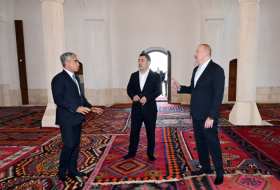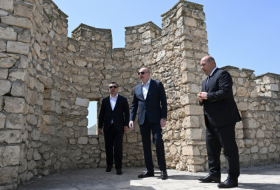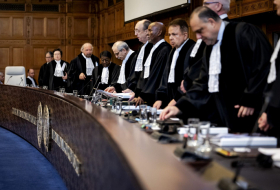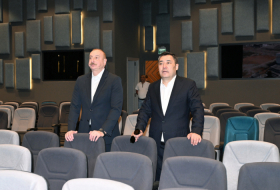- Mr. Jankauskas, Azerbaijan and the EU are expected to complete negotiations on comprehensive and enhanced partnership agreement with EU in 2018. Can you elaborate on what kind of benefits this agreement with the EU will bring Azerbaijan?
- The EU and Azerbaijan currently base their relations on the Partnership and Cooperation agreement, which was signed in 1996 and entered into force in 1999. This agreement is more than 20 years old and. Since then, both the EU and Azerbaijan have developed substantively, as have our relations. So, the legal and political basis for our partnership should be renewed to reflect current realities.
Our negotiations currently proceed in three different strands: (a) political and security, (b) trade and (c) sectorial.
The EU is Azerbaijan’s largest economic partner representing 48.6% of its foreign trade. The EU is also the largest foreign direct investor in Azerbaijan in both oil and non-oil sectors. In 2016, Azerbaijan embarked on major economic diversification program and is keen to benefit from European knowledge, management experience and technologies. The EU Delegation is coordinating large assistance portfolio aiming to improve education, public finances, statistics, agriculture, justice, vocational education training and many other areas.
The New Partnership agreement will reflect the latest developments in all of these areas, cement our partnership, and provide a basis for future mutually beneficial cooperation. The new agreement will be win-win for both sides.
We have been negotiating for only one year. This is a short time for such a complex fundamental agreement. I can confirm readiness on both sides to move forward with negotiations this year. The sooner we agree and sign, the sooner we will see and be able to enjoy the benefits of this agreement which will bring people closer together, provide for more investments, more opportunities for companies and citizens.
- And what will the EU get in return?
- The European Union is interested in peace, security and stability in its neighbourhood. Azerbaijan is an important partner in our Eastern Neighbourhood. We are interested in supporting sustainable development of our partners and broadening political, security, economic and trade relations with them.
For many years Azerbaijan has been our reliable energy partner and its importance will grow when the Southern Gas Corridor is finished. Azerbaijan has recently advanced several important projects, such as Baku-Tbilisi-Kars railway and is building new Port in Alat with a Free economic zone. EU is interested in these projects, in new possibilities for trade and transportation.
Azerbaijan has been providing stability in a complex region for years, it plays a key role as a bridge between cultures with its strong traditions of secularism, tolerance and multiculturalism.
The new agreement will cement our partnership for the years to come.
- Should the comprehensive and enhanced partnership agreement be signed, which field of Azerbaijani economy is the EU planning to finance? What kind of means do the sides need to allocate to be able to meet the conditions of the agreement?
- Let me start by saying that the new Partnership agreement will not require specific means for its implementation per se. It is an agreement, which sets the basis for future cooperation and opens new opportunities.
Azerbaijan can already benefit from TAIEX and Twinning instruments that the European Union has opened for all its partners. I have to say that Azerbaijan is making very good use of these financial instruments which bring not only money but, first of all, knowledge which is worth a lot.
There is more untapped potential and I already see good efforts of several ministries in Baku to apply for additional use of available finances in different areas.
In parallel to the ongoing negotiations, the EU and Azerbaijan have been discussing short-medium term priorities for EU-Azerbaijan financial and technical cooperation. Priority areas include:
- Economic development and market opportunities supporting Azerbaijan in its process of economic diversification and identification of new sources of sustainable private-led growth, while reducing regional disparities;
- Strengthening institutions and good governance including support for strengthened rule of law and public administration reform;
- Connectivity, energy efficiency, environment and climate action including support to enable Azerbaijan to become a transport and logistics hub, support to energy (efficiency) reforms and environmental protection;
- Mobility and people-to-people contacts support to modernize the education sector in line with EU best practice and standards, with a view to reducing the skills mismatch between the educational outcomes and the demands of the economy, as well as support for migration management.
I also believe that strengthening of EU-Azerbaijan partnership will bring more European investments into your country. In short, the new agreement will be politically and economically beneficial for both sides.
- How does Azerbaijan assess cooperation with the European Union and signing a comprehensive and enhanced partnership agreement with the EU? What do the surveys show?
So far, I have heard very positive comments about Azerbaijan-EU cooperation both in Baku and in the regions of Azerbaijan. The main question asked is "When will it be signed?", so I believe people are interested in having it as soon as possible.
2017 Public Opinion Poll about the European Union conducted in Azerbaijan by the EU-funded ‘EU NEIGHBOURS east’ project, based on face-to-face interviews among a representative sample of 1000 people show substantive improvement in attitudes towards the EU:
· pro-EU feelings have risen in Azerbaijan - 47% of Azerbaijanis have a positive image of the EU (against 27% in 2016);
· 68% of Azerbaijanis feel relations with the European Union are good, well ahead of the regional average of 61%;
· more than half of Azerbaijanis (51%) trust the EU;
· 33% of Azerbaijanis are aware of the EU’s financial support to the country, 65% of those felt it was effective (compared to a regional average of 53%).
The survey has also shown that people associate themselves with values, which the European Union represents. This is a very important basis for our partnership, which we should nourish and develop further.
- The aviation agreement between the EU and Azerbaijan is almost completed. Why did the need for making such agreement arise? Can you elaborate on the main directions in the cooperation between Baku and Brussels within this agreement?
- The Aviation Agreement is an important element to better connect Azerbaijan and the EU. Azerbaijan is currently working on its aspiration to become a Regional Transportation Hub. It has invested a lot into railroads, automobile routes, new Sea Port, ferries, is working on the free economic zone. This project would be incomplete without the air component.
Secondly, this agreement would render tremendous help to economic diversification agenda. Development of tourism is one of the goals. Last year 2.6 million tourists visited Azerbaijan, but only little over 0.1 million of them came from EU countries. There is huge potential, but you need more means to bring these tourists to Azerbaijan.
The European Union has signed similar agreements with many other countries. Experience shows tremendous growth in air traffic and increase in direct connectivity after the signature. Let me bring several examples:
• The case of Israel – traffic has grown by one third in 3 years to 10 million passengers and there are 46 more city pairs;
• Moldova experienced 80% traffic growth within 4 years and 9 more city pairs;
• Georgia with 55% of traffic growth in 6 years and 12 more city pairs.
EU-Azerbaijan air traffic has also been growing recently but at a lower rate with a compound annual growth of 2.1% during the 5 last years. Signature of Aviation agreement is a great opportunity to seize! Aviation Agreement will also pave the way for a more complex cooperation in other fields of aviation including safety and security.
Last but not least, this agreement would not only bring more Europeans to Azerbaijan but would also facilitate travels for Azerbaijani people to Europe. People-to-people contacts are the first prerequisite for stronger partnership and better understanding. The text of the agreement is almost ready and we are waiting for the green light from Baku.
- 2017 was a complicated year for the European Union – the migration crisis, Brexit, the ever-growing rivalry between Berlin and Paris, the crisis in Poland, Catalonia. The euro crisis in Greece is still not over and the EU still has certain economic problems. The crisis with Islam terrorists is also protracted. Can you please tell us what kind of future is in for the EU after the exit of Great Britain and will the European Union be able to solve at least a part of the accrued problems in 2018?
- You named it all! This was indeed a challenging period for the EU, as it was for Azerbaijan. Yet, the European Union is solving these challenges, moving forward, and remains one of the most desired places to live. We do not deny existing challenges. They are caused by the complexity of the Union, its wide neighbourhood, active participation in the international affairs and many other reasons. EU member states and institutions, governments and the civil society are working together to find solutions to a variety of challenges.
I would say that 2016 was a much more difficult year for the EU than 2017. The refugee crisis has been taken under control. The EU27 has shown strong unity and resolve towards the Brexit. We work together to make the EU stronger and more resilient to tackle current and future challenges of migration, hybrid warfare, defence, internal and external security. EU's latest economic figures have also shown an impressive and robust performance in all EU Member States: On average 2.4% growth in 2017 and 2.3% expected in 2018. In December 2017, the EU adopted a permanent structured cooperation to strengthen defence cooperation among 25 Member States.
I would say that more resilient, stronger, forward-looking and needs-driven EU has merged after the crisis. We know that there will be new challenges facing us in the future. Nevertheless, what matters is that we have proven record of tackling them and we are confident, that by working together we are stronger than facing them alone.
- Do you think the abovementioned factors may have an impact on the EU-Azerbaijan cooperation after we sign the comprehensive and enhanced partnership agreement?
- The new agreement will set the basis for partnership and cooperation between Azerbaijan and the EU in a wide variety of areas. It will open ways for Azerbaijan to benefit from EU knowledge, technologies and experience. This will help Azerbaijan to not feel alone while facing modern challenges in its complex neighbourhood. We will be partners, therefore it is called a “partnership” agreement. The EU will also benefit from having a strong partner in the region.
If you think of a possible impact of the Brexit, the EU-Azerbaijan agreement will be a separate agreement and it will not affect the bilateral agreements between European countries and Azerbaijan. The bilateral relations between EU member states and Azerbaijan exist alongside the EU-Azerbaijan relations, they are aimed at complementing and enhancing each other.
- How did the Cooperation Council meeting go in Brussels on 9 February? What did you manage to settle with the Azerbaijani side?
- This was a very important meeting. Under the current Partnership and Cooperation agreement, Cooperation Councils should take place every year. However, last such meeting took place in 2014. There has been a gap, which we started to overcome last year. Cooperation Council this February was the final point in overcoming the period of difficulties in our relations and returning EU-Azerbaijan partnership to the positive and dynamic stage.
We had a very good exchange of views on a variety of global and regional challenges. We touched upon the most important issues of security, political and economic bilateral cooperation. We discussed how to move our relations forward, how to make this year positive and productive. We also spoke about remaining differences. It is very important that we can openly discuss any issues, easy or hard, and to try to find solutions.
We have agreed to establish security dialogue in addition to already existing high-level dialogues on energy and transport. I believe this is a significant step forward in our partnership.
- The Minister of Foreign Affairs, Elmar Mammadyarov, said that there are no serious obstacles in preparing the new agreement on strategic partnership between Azerbaijan and European Union, however there are certain discrepancies on trade issues: “As Azerbaijan is still not a member of the World Trade Organization (WTO), we are experiencing certain discrepancies when it comes to issues of tariffs and subsidies”, Mammadyarov said. What kind of discrepancies did he talk about? And how are Azerbaijan and the EU going to overcome these challenges?
- Our negotiations on the trade chapter of the new agreement are important for Azerbaijan to fully benefit from the opportunities that world and regional trade has to offer allowing its standards to move closer to WTO standards.
The WTO has 164 members; by now almost all CIS countries have become members of the WTO. Azerbaijan is negotiating its accession into the WTO, but is at present among the very few countries in the world that are not a part of the WTO. If it were, it would be enough to make a reference to it. Now our negotiators have to go through various WTO provisions and to agree what to transfer or not into our partnership agreement.
WTO obliges its members to apply certain set of rules to trade. It makes sure that competition for businesses is fair, non-discriminatory and predictable. It gradually eliminates certain tariffs and non-trade barriers and through this makes WTO member countries more attractive for trade and investment. It ultimately brings in more trade, more investment, higher standards and lower prices. We believe WTO membership is key for Azerbaijan to succeed in its economic diversification agenda; be it for agriculture, transport and logistics, tourism or industry.
The EU offers Azerbaijan a market of 500 million people, but it asks in return to also apply certain rules to European products at home. Baku needs to decide what ambitions it has vis-à-vis global trade and how ready it is to open up to global competition.
Seymour Mammadov
More about: Azerbaijan EU
















































